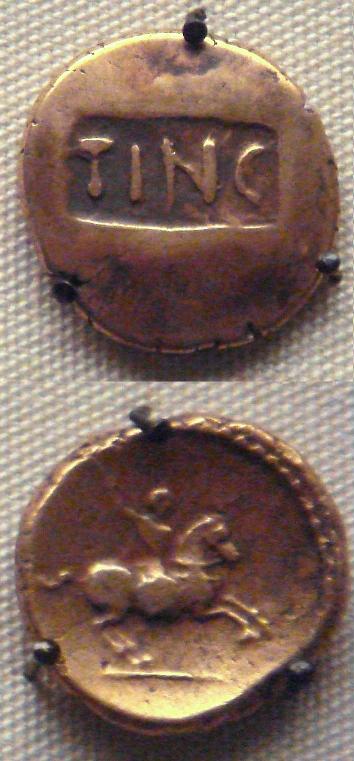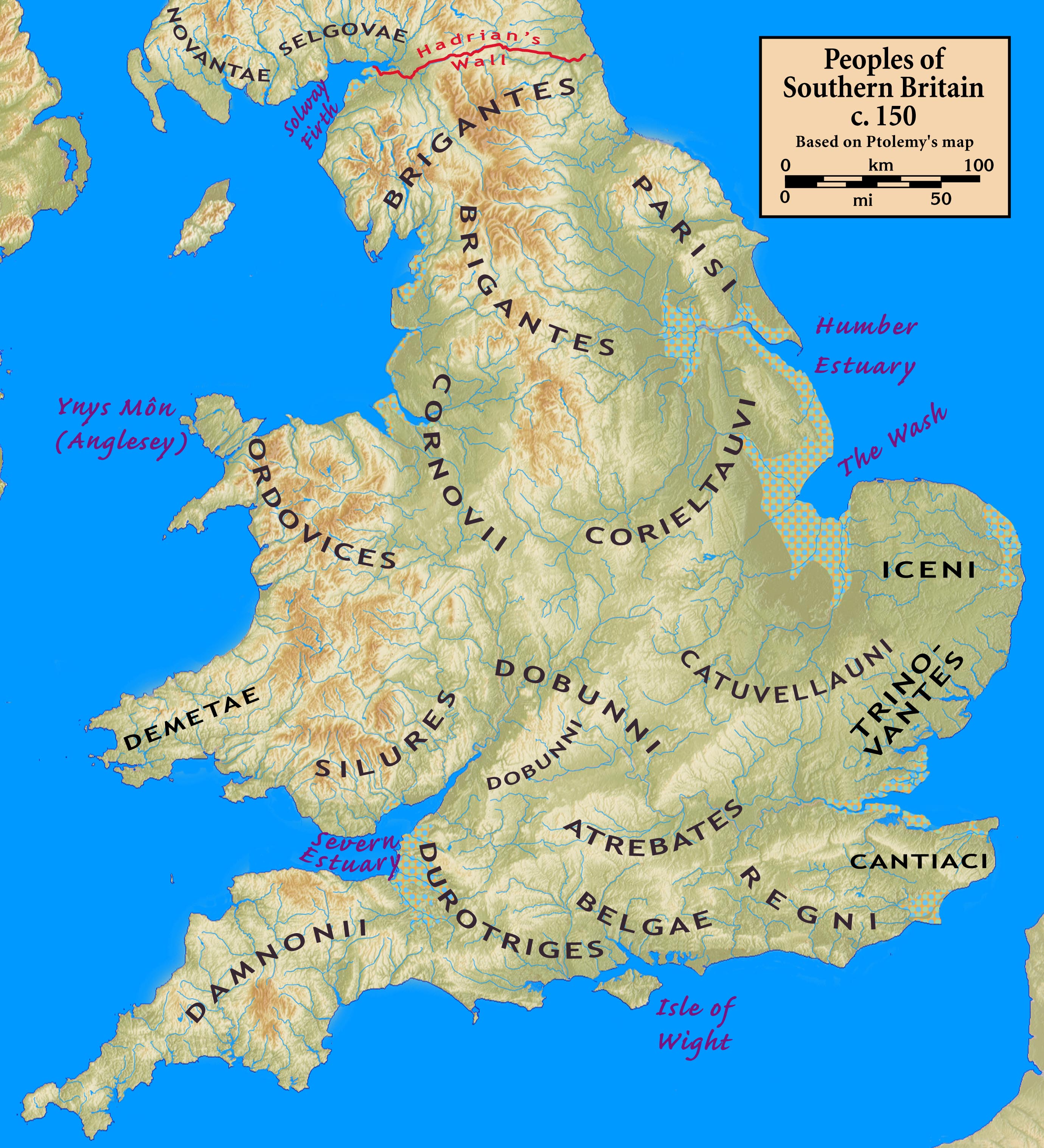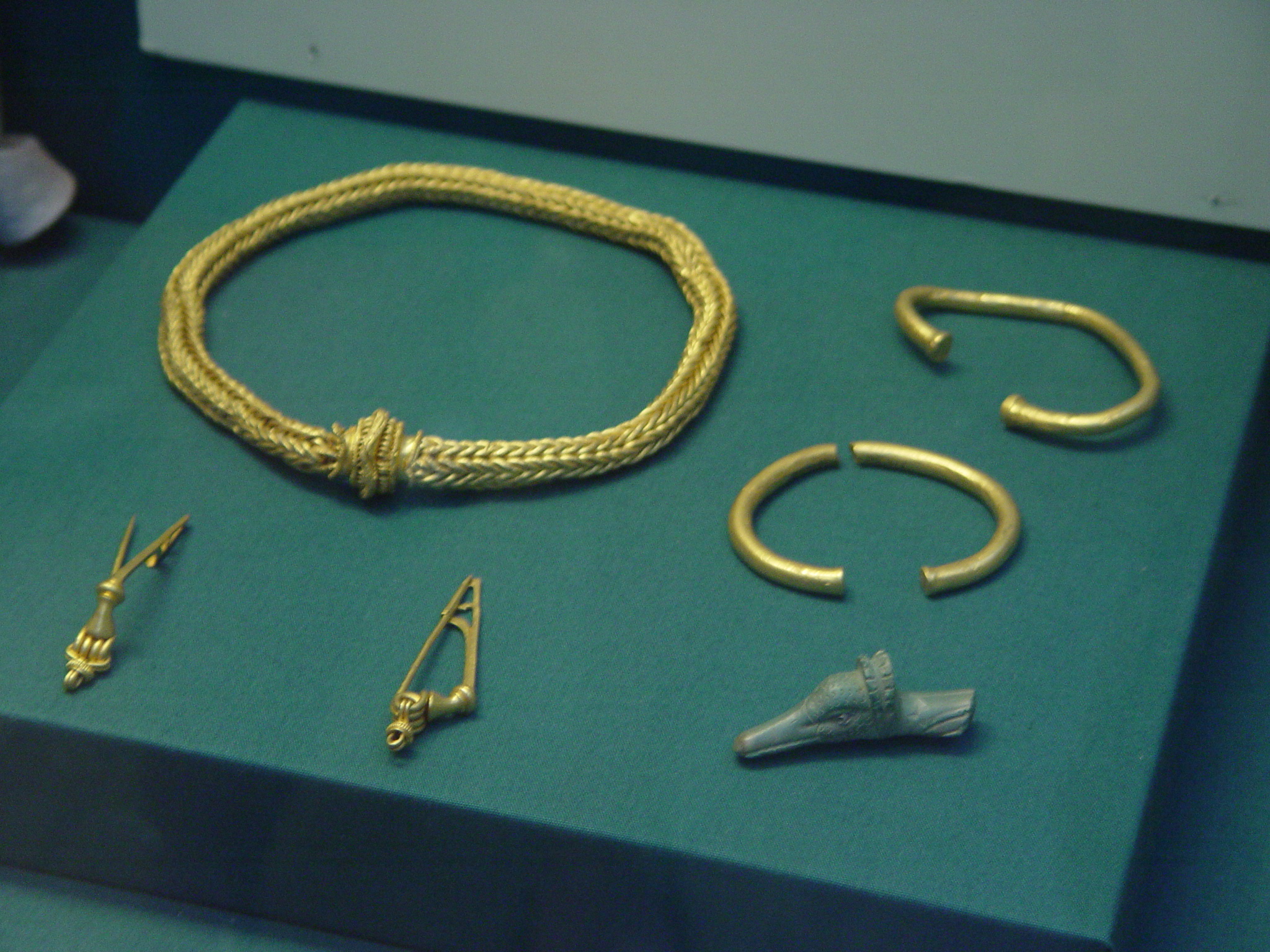|
Verica
Verica (early 1st century AD) was a British client king of the Roman Empire in the years preceding the Claudian invasion of 43 AD. From his coinage, he appears to have been king of the probably Belgic Atrebates tribe and a son of Commius. The distribution of his coins also shows that Verica's kingdom was centred on modern Sussex and east Hampshire, and its capital would have been in or close to what became the Roman Noviomagus Reginorum (modern Chichester). He succeeded his elder brother Eppillus as king in about 15 AD, and may also have reigned over the northern Atrebatic kingdom at Calleva Atrebatum, today called Silchester. He was recognised as '' rex'' by Rome and appears to have had friendly trade and diplomatic links with the empire. His territory was pressed from the east by the Catuvellauni, led by Epaticcus, brother of Cunobelinus, who conquered Calleva in about 25 AD. After Epaticcus's death ca. 35 AD Verica regained some territory, but Cunobelinus's son Carat ... [...More Info...] [...Related Items...] OR: [Wikipedia] [Google] [Baidu] |
Atrebates
The Atrebates (Gaulish: *''Atrebatis'', 'dwellers, land-owners, possessors of the soil') were a Belgic tribe of the Iron Age and the Roman period, originally dwelling in the Artois region. After the tribes of Gallia Belgica were defeated by Caesar in 57 BC, 4,000 Atrebates participated in the Battle of Alesia in 53, led by their chief Commius. They revolted again in 51 BC, after which they maintained a friendly relationship with Rome, as Commius received sovereignty over the neighbouring Morini. The quality of their woollens is still mentioned in 301 AD by Diocletian's Price Edict. An offshoot of the Belgic tribe probably entered Britain before 54 BC, where it was successively ruled by kings Commius, Tincommius, Eppillus and Verica. After 43 AD, only parts of the area were still controlled by king Claudius Cogidubnus, after which they fell under Roman power. Name They are mentioned as ''Atrebates'' by Caesar (mid-1st c. BC) and Pliny (1st c. AD), ''Atrebátioi'' (Ἀ� ... [...More Info...] [...Related Items...] OR: [Wikipedia] [Google] [Baidu] |
Eppillus
Eppillus (Celtic: "little horse") was the name of a Roman client king of the Atrebates tribe of the British Iron Age. He appears to have ruled part of the territory that had previously been held by Commius, the Gaulish former ally of Julius Caesar who fled to Britain following the uprising of Vercingetorix, or possibly of his son. Eppillus is not mentioned in any historical sources. Coins bearing his name also bear the inscription COMMI.FILI which is generally read as ''Commios filius'' indicating at least a claim to be Commius's son. After Commius's death in about 20 BC, based on numismatic evidence, Eppillus seems to have ruled jointly with another ruler named Tincomarus. The COMMI.FILI inscription also appears on Tincomarus's coins suggesting they could have been brothers. Eppillus's capital was Noviomagus Reginorum (Chichester) in the south of the kingdom, while Tincomarus ruled from Calleva Atrebatum ( Silchester) in the north. Eppillus became ruler of the whole territory ... [...More Info...] [...Related Items...] OR: [Wikipedia] [Google] [Baidu] |
Roman Client Kingdoms In Britain
The Roman client kingdoms in Britain were native tribes which chose to align themselves with the Roman Empire because they saw it as the best option for self-preservation or for protection from other hostile tribes. Alternatively, the Romans created (or enlisted) some client kingdoms when they felt influence without direct rule was desirable. Client kingdoms were ruled by client kings. In Latin these kings were referred to as ''rex sociusque et amicus'', which translates to "king, ally, and friend". The type of relationships between client kingdoms and Rome was reliant on the individual circumstances in each kingdom. The beginnings of the system are to be found in Caesar's re-enthroning of Mandubracius as king of the Trinovantes, who had been dethroned by Cassivellaunus and then aided Caesar's second invasion of Britain in 54 BC. The system further developed in the following hundred years, particularly under Augustus's influence, so that by the time of the Roman invasion in ... [...More Info...] [...Related Items...] OR: [Wikipedia] [Google] [Baidu] |
Roman Invasion Of Britain
The Roman conquest of Britain was the Roman Empire's conquest of most of the island of Britain, which was inhabited by the Celtic Britons. It began in earnest in AD 43 under Emperor Claudius, and was largely completed in the southern half of Britain (most of what is now called England and Wales) by AD 87, when the Stanegate was established. The conquered territory became the Roman province of Britannia. Following Julius Caesar's invasions of Britain in 54 BC, some southern British chiefdoms had become allies of the Romans. The exile of their ally Verica gave the Romans a pretext for invasion. The Roman army was recruited in Italia, Hispania, and Gaul and used the newly-formed fleet ''Classis Britannica''. Under their general Aulus Plautius, the Romans pushed inland from the southeast, defeating the Britons in the Battle of the Medway. By AD 47, the Romans held the lands southeast of the Fosse Way. British resistance was led by the chieftain Caratacus until his defeat in ... [...More Info...] [...Related Items...] OR: [Wikipedia] [Google] [Baidu] |
Commius
Commius (Commios, Comius, Comnios) was a king of the Belgic nation of the Atrebates, initially in Gaul, then in Britain, in the 1st century BC. Ally of Caesar When Julius Caesar conquered the Atrebates in Gaul in 57 BC, as recounted in his ''Commentarii de Bello Gallico'', he appointed Commius as king of the tribe. Before Caesar's first expedition to Britain in 55 BC, Commius was sent as Caesar's envoy to persuade the Britons not to resist him, as Caesar believed he would have influence on the island. However he was arrested as soon as he arrived. When the Britons failed to prevent Caesar from landing, Commius was handed over as part of the negotiations. Commius was able to provide a small detachment of cavalry from his tribe to help Caesar defeat further British attacks. During Caesar's second expedition to Britain Commius negotiated the surrender of the British leader Cassivellaunus. He remained Caesar's loyal client through the Gaulish revolts of 54 BC, and in return Caesar ... [...More Info...] [...Related Items...] OR: [Wikipedia] [Google] [Baidu] |
Cogidubnus
Tiberius Claudius Cogidubnus (or Togidubnus, Togidumnus or similar; see naming difficulties) was a 1st-century king of the Regni or Regnenses tribe in early Roman Britain. Chichester and the nearby Roman villa at Fishbourne, believed by some to have been Cogidubnus' palace, were probably part of the territory of the Atrebates tribe before the Roman conquest of Britain in AD 43. Cogidubnus may therefore have been an heir of Verica, the Atrebatic king whose overthrow prompted the emperor Claudius to invade. After the conquest, the area formed part of the civitas of the Regnenses / Regni, possibly Cogidubnus' kingdom before being incorporated into the Roman province. The public baths, amphitheatre and forum in Silchester were probably built in Cogidubnus' time. Sources In Tacitus's ''Agricola'', published 98, where his name appears as "Cogidumnus" in most manuscripts although they can be considered as copies, and "Togidumnus" in one, X�AVCTORITAT ·TI�CLAVD· OIDVBNI·R G·M ... [...More Info...] [...Related Items...] OR: [Wikipedia] [Google] [Baidu] |
Roman Britain
Roman Britain was the territory that became the Roman province of ''Britannia'' after the Roman conquest of Britain, consisting of a large part of the island of Great Britain. The occupation lasted from AD 43 to AD 410. Julius Caesar invaded Britain in 55 and 54 BC as part of his Gallic Wars. According to Caesar, the Britons had been overrun or culturally assimilated by the Belgae during the British Iron Age and had been aiding Caesar's enemies. The Belgae were the only Celtic tribe to cross the sea into Britain, for to all other Celtic tribes this land was unknown. He received tribute, installed the friendly king Mandubracius over the Trinovantes, and returned to Gaul. Planned invasions under Augustus were called off in 34, 27, and 25 BC. In 40 AD, Caligula assembled 200,000 men at the Channel on the continent, only to have them gather seashells () according to Suetonius, perhaps as a symbolic gesture to proclaim Caligula's victory over th ... [...More Info...] [...Related Items...] OR: [Wikipedia] [Google] [Baidu] |
Regni
The Regni (also the Regini or the Regnenses) were a Celtic tribe or group of tribes living in Britain prior to the Roman Conquest, and later a civitas or canton of Roman Britain. They lived in what is now Sussex, as well as small parts of Hampshire, Surrey and Kent, with their tribal heartland at Noviomagus Reginorum (modern Chichester). Territory It is generally accepted that the Regni broadly occupied the region that later became Sussex. Surrey is sometimes included within Regni territory and sometimes within the territory of the Atrebates to the north. However the archeological record north of the Weald shows significant differences to the south and so it would appear Surrey was not normally included in the Regni tribal area. The tribe was surrounded on the west by the Belgae, on the north by the Atrebates, and on the east by the Cantiaci. To the south and east across the ''Oceanus Britannicus'' or ''Oceanus Gallicus'' (the present day English Channel) lay Gaul and the trib ... [...More Info...] [...Related Items...] OR: [Wikipedia] [Google] [Baidu] |
Sussex
Sussex (Help:IPA/English, /ˈsʌsɪks/; from the Old English ''Sūþseaxe''; lit. 'South Saxons'; 'Sussex') is an area within South East England that was historically a kingdom of Sussex, kingdom and, later, a Historic counties of England, county. It includes the Ceremonial counties of England, ceremonial counties of East Sussex and West Sussex. The area borders the English Channel to the south, and the Ceremonial counties of England, ceremonial counties of Surrey to the north, Kent to the north-east, and Hampshire to the west. Sussex contains the city of Brighton and Hove and its wider Greater Brighton City Region, city region, as well as the South Downs National Park and the National Landscapes of the High Weald National Landscape, High Weald and Chichester Harbour. Its coastline is long. The Kingdom of Sussex emerged in the fifth century in the area that had previously been inhabited by the Regni tribe in the Roman Britain, Romano-British period. In about 827, shortly a ... [...More Info...] [...Related Items...] OR: [Wikipedia] [Google] [Baidu] |
Caratacus
Caratacus was a 1st-century AD British chieftain of the Catuvellauni tribe, who resisted the Roman conquest of Britain. Before the Roman invasion, Caratacus is associated with the expansion of his tribe's territory. His apparent success led to Roman invasion, nominally in support of his defeated enemies. He resisted the Romans for almost a decade, using guerrilla warfare, but when he offered a set-piece battle he was defeated by Roman forces. After defeat he fled to the territory of Queen Cartimandua, who captured him and handed him over to the Romans. He was sentenced to death but made a speech before his execution that persuaded the Emperor Claudius to spare him. Caratacus' speech to Claudius has been a popular subject in visual art. Name Caratacus' name appears as both ''Caratacus'' and ''Caractacus'' in manuscripts of Tacitus, and as ''Καράτακος'' and ''Καρτάκης'' in manuscripts of Dio. Older reference works tend to favour the spelling "Caractacus", coi ... [...More Info...] [...Related Items...] OR: [Wikipedia] [Google] [Baidu] |
Cunobelinus
Cunobeline or Cunobelin (Common Brittonic: *''Cunobelinos'', "Dog-Strong"), also known by his name's Latin form , was a king in pre-Roman Britain from about to about Malcolm Todd (2004)"Cunobelinus [Cymbeline/nowiki> (d. ''c''. AD 40), king in southern Britain"">/nowiki>Cymbeline">"Cunobelinus [Cymbeline/nowiki> (d. ''c''. AD 40), king in southern Britain" ''Oxford Dictionary of National Biography''. Retrieved 28 December 2017. He is mentioned in passing by the classical historians Suetonius and Dio Cassius, and many coins bearing his inscription have been found. He controlled a substantial portion of southeastern Britain, including the territories of the Catuvellauni and the [ rinovantes, and he was called " King of the Britons" (''Britannorum rex'') by Suetonius. Cunobeline may have been a client king of Rome, based on the images and legends appearing on his coins. Cunobeline appears in British legend as Cynfelyn ( Welsh), Kymbelinus (medieval Latin) or Cymbeline, as in the ... [...More Info...] [...Related Items...] OR: [Wikipedia] [Google] [Baidu] |






